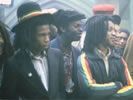Eye For Film >> Movies >> Babylon (1980) DVD Review
Remembering details 28 years after the event is unpredictable at best. What is admirable about the Babylon crew is that they give it a go. So many DVDs of this period can’t be bothered, simply dropping a Picture Gallery, or cast biog listings, into the Extras and leaving it at that.
The Babylon commentary track uses four voices, those of producer Gavrik Losey, lead actor Brinsley Forde, so-writer Martin Stellman and director Franco Rosso. Having this much aural input usually ends in chaos, but not here. With perfect manners and a delicate sensibility towards any suggestion of memory loss, they don’t talk over each other and refrain from that other killer of multiple-voiced talkathons, the anecdotal ego wars.

Stellman and Rosso got together to work on the script after Rosso read an article of Stellman’s in Time Out. People assumed that the dialogue was adlibbed and although some of the actors improvised their Jamaican patois it remained true to the written word.
“A lot of the stuff was done on the hoof,” Losey remembers. “We didn’t have the money to buy the streets.” Although set in Brixton “most of the film was shot in Depford and Lewisham.”
It is an understatement to say that Babylon was before its time. “It was not acceptable,” Rosso says. “There was a lot of prejudice against it.” Despite this, he sold 16 copies of the film to the police “to show how not to behave with the black community” and “Lord Scarman asked to see it to find out what was happening in the inner city.”
The Q&A at the BFI in 2008, after a showing of the restored print, involved all of the above plus a handful more, including the loquacious and entertaining Trevor Laird, who played Beefy.
Stellman recalls that originally it was scheduled to be shown on Play For Today, “but the BBC got scared and gave it back to us.” Forde remembers that in the Seventies “there was nothing for black actors to do.” In fact, during the audio commentary, Rosso praised the performances of his young cast and said “they might have spawned a few parts for some of them, but it never happened.”
Rosso was never given the chance to make another film. “I couldn’t find the money and so went back to being an editor.” The BBC was very Oxford and Cambridge in those days and Rosso didn’t fit in.
Reviewed on: 04 Dec 2008


















